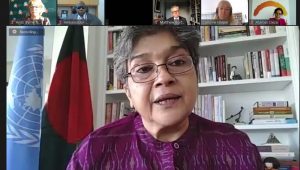Join the Leading Global Eye Health Alliance.
Membership-
Choose an alternate language here
We had ambitious plans for 2020: a Global Assembly in Singapore, a World Health Assembly Resolution and a staggering 50 national launches of the World Report on Vision. Of course, all of this came to a grinding halt with the arrival of Covid-19. The pandemic wreaked havoc across the world and dealt major setbacks to health, development and eye care.
The Covid-19 physical distancing measures made some of our plans practically impossible – no more flights or conference rooms. We were also very aware that global attention, from government leaders to the WHO, was focused on the pandemic.
And yet, somewhat remarkably, 2020 ended up being a hugely successful year for eye health advocacy. We adapted – moving events to Zoom and investing more in our online presence. But we also had the benefit, as advocates, of a good issue. Eye health is universal, it has solutions and offers huge opportunities for growth and development. For global leaders, eye health was a breath of fresh air in an otherwise miserable year. There was hope in sight.
This has meant that our advocacy work has not only continued but reached new heights. A few key developments include:
In August, following a year-long advocacy campaign by IAPB and its members, countries cemented their commitment to the World Report on Vision by adopting a World Health Assembly (WHA) resolution. The resolution commits countries to implementing integrated people centred eye care as part of Universal Health Coverage and to setting global targets on eye care for 2030 (to be presented and adopted at the 74th WHA next year).
The 2020 IPEC resolution was co-sponsored by more than 40 countries making it one of the most widely support resolutions at the WHA this year.
 We worked hard to increase the profile of eye health and its contribution to the Sustainable Development Goals at the United Nations (UN). We held some of our most successful events virtually which were attended by political leaders, UN Ambassadors, Royalty, the Head of UNICEF, civil society and the private sector.
We worked hard to increase the profile of eye health and its contribution to the Sustainable Development Goals at the United Nations (UN). We held some of our most successful events virtually which were attended by political leaders, UN Ambassadors, Royalty, the Head of UNICEF, civil society and the private sector.
We also strengthened the UN Friends of Vision by obtaining two new illustrious and influential co-chairs: Ambassador Rabab Fatima, the Permanent Representative of Bangladesh and currently President of UNICEF Executive Board; and Ambassador Geraldine Byrne Nason, the Permanent Representative of Ireland, recently elected to the UN Security Council.
IAPB and its members are currently championing the adoption of the first-ever UNGA resolution on vision. The UNGA resolution (if passed) will be a landmark, firmly placing vision on the sustainable development agenda and motivating action by the UN and its institutions. It will also encourage a whole of government approach – all parts of government, especially those responsible for health, education, economic development and women’s issues, working together with civil society and the private sector on eye care. The resolution is expected to be adopted in early 2021.
What next?
Next year our focus will be on cementing some of these gains, including the adoption of the UNGA resolution and the WHO global targets on eye care. But it will also be time for us to turn some of this political good will into action at a national level. IAPB members held eight launches of the World Report on Vision over the last year, some virtually and all with great success. We will want to resume this activity next year; shifting our approach from launches to policy dialogues thereby enabling national planning and securing specific commitments from governments.